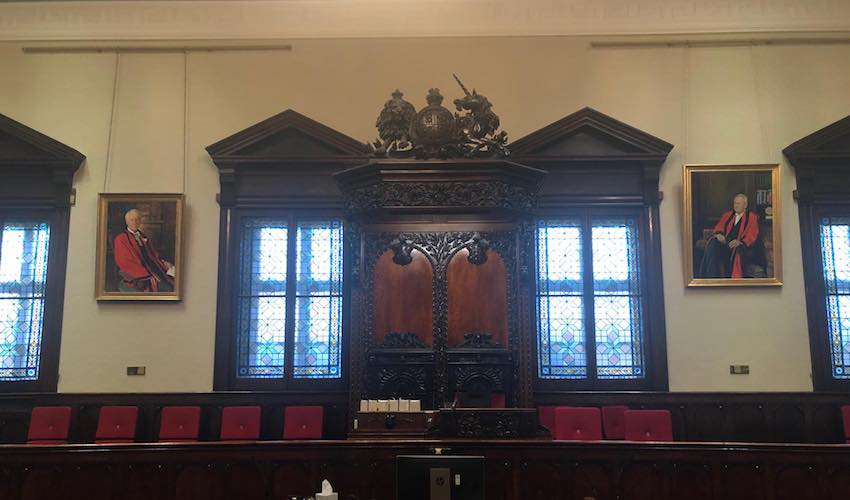


A 35-year-old man, who was jailed after a ‘sleeper hold’ assault, has failed to convince the Court of Appeal that he was the victim of a miscarriage of justice.
Aaron Le Gros was sentenced to two-and-a-half years behind bars in June 2021 for one count of grave criminal assault and six of possession of controlled drugs.
While he had admitted possessing steroids valued between £210 and £290, Le Gros denied the assault and possessing cocaine.
He was however convicted of both by a jury trial in February 2021.

Pictured: Le Gros was convicted of grave and criminal assault and possession of cocaine by a jury.
The case focused on an incident that took place on 20 September 2019 after Le Gros invited a number of people at his home, including the victim and his girlfriend, with whom he had previously had a brief relationship.
Concerned about Le Gros encouraging his girlfriend to take the cocaine that was on his table, the victim snatched the bag and ran away with it. Le Gros caught up with him and assaulted him by placing him in a ‘sleeper hold’.
He tried to call out but was not able to do so and collapsed on the floor, at which point Le Gros kicked him.
The incident was witnessed by someone living nearby who said they had heard a man shouting, “Where’s my cocaine, where’s my f****** drugs? What have you done with them?” whilst kicking another man on the floor.
They called the police, who found the victim on the floor in a foetal position, not responding.
Le Gros was arrested on the scene after he returned with the victim’s girlfriend. Officers found a bag of cocaine, worth £30, in his shirt pocket as well as a brown box containing several vials of steroids, which were valued between £210 and £290 in his flat.

Pictured: Advocate Darry Robinson represented Le Gros during the trial.
Throughout the proceedings, Le Gros was represented by Advocate Harry Robinson. Appealing against his conviction for grave and criminal assault, Le Gros argued his lawyer had failed to tell the jury he was acting in self-defence and that he had taken the cocaine from the victim who had been using it in his home.
Le Gros also argued Advocate Robinson had not warned him of the consequences of not giving evidence during his trial. His new legal representative, Advocate Julia-Anne Dix, suggested that the trial had not been fair and that Le Gros had been the victim of a miscarriage of justice.
The Court accepted that Advocate Robinson should have been more “precise” in his question to the victim and should have “spelled out expressly and unequivocally” the case of self-defence to the jury.
They said there were “undoubtedly some shortcomings” in the service he provided but added it was “striking and to his credit” that he had accepted he “could have done better” in presenting the self-defence case.
They however said they had “no doubt” the omission had not led to a miscarriage of justice, noting that the lawyer’s questions were designed to “throw doubt” upon the assault itself and made it clear Le Gros was “denying any unlawful assault”.
In addition, the Court noted that Royal Court Commissioner Julian Clyde-Smith had “unequivocally” left the defence of self-defence open to the jury in his summing-up.

Pictured: Le Gros argued he had been a victim of a miscarriage of justice because of the way his lawyer advised him and presented his case.
In their judgment, the Court noted there was a “stark factual dispute” regarding whether Advocate Robinson had advised Le Gros about the consequences of not giving evidence. Le Gros claimed his lawyer had “told” him not to and never properly understood the implications.
Advocate Robinson said he had “considerable doubts” from the beginning about whether Le Gros should give evidence as he was “dubious” about his ability to be a convincing witness. He was also aware Le Gros might “attack the character” of the victim and his girlfriend, running the risk of his previous convictions for affray and cultivating cannabis being discussed in Court.
The lawyer however said he had kept the possibility open until the day of the trial, when proceedings where adjourned so he could discuss giving evidence with Le Gros.
The Court said they neither believed Advocate Robinson was “the kind of person to ‘tell’ his client’ what to do” nor that Le Gros would “meekly accept any such attempted instruction”. They also added that Le Gros’s version of events was “inconsistent” with emails from his lawyer, a form submitted to the Court on his behalf, his own statement, the discussion that took place during the trial and Advocate Robinson’s notes of it.
The Court said they didn’t accept Le Gros had “laboured under a misapprehension about the significance of not giving evidence in his own defence” as it would have been obvious to a “man of his intelligence”.
They added that they were satisfied that Advocate Robinson had “sound reasons” for advising him of the risks of giving evidence, and concluded Le Gros himself decided he would not give evidence, based on the risks of doing so.
They concluded Le Gros’ conviction didn’t constitute a miscarriage of justice and dismissed his appeal.
Comments
Comments on this story express the views of the commentator only, not Bailiwick Publishing. We are unable to guarantee the accuracy of any of those comments.